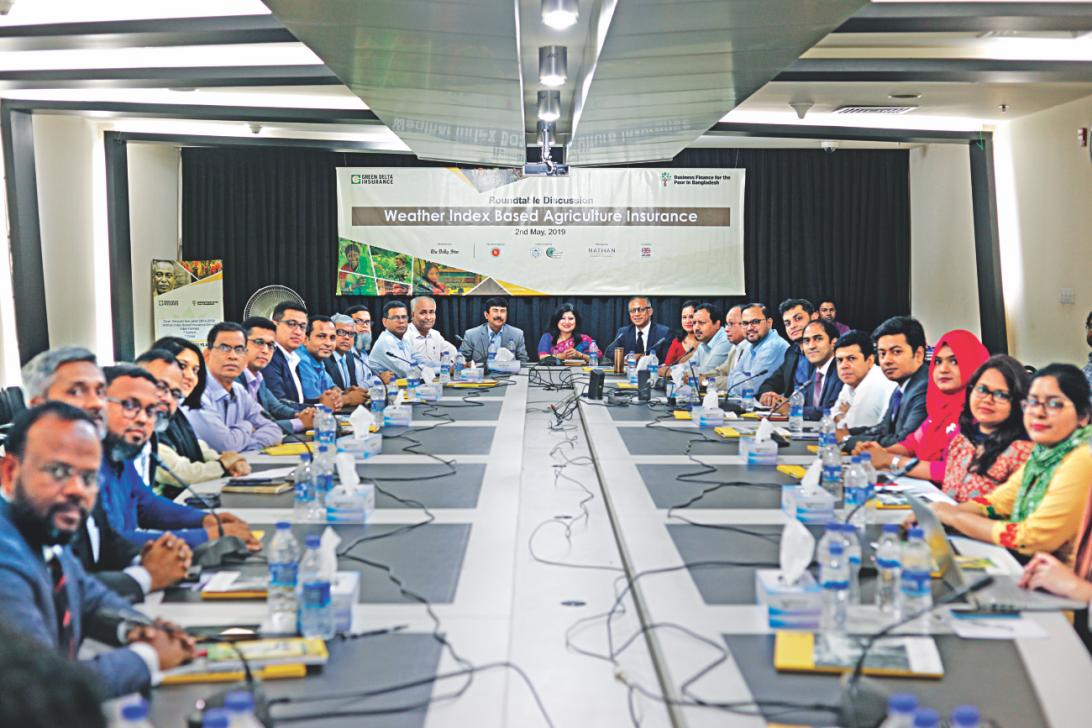Growth of weather index based agriculture insurance in Bangladesh
On Thursday 2 May 2019, we met with banks and financial institutions in Dhaka to share the learning experience from the Weather Index Based Agriculture Insurance (WIBAI) venture by Green Delta Insurance Company Limited. This venture is co-funded by the Business Finance for the Poor in Bangladesh (BFP-B) as part of the Challenge Fund initiatives. BFP-B is funded by UK Aid and managed by Nathan Inc.
Due to geographical conditions, Bangladesh is affected by weather changes every year. 72 million people involved in the agricultural sector are adversely affected by weather-based calamities. The agricultural sector which contributes to 14% of the country’s economy faces financial risks due to bad weather. To mitigate financial losses and de-risk agri investments, Green Delta Insurance Company launched the first-ever Weather Index Based Agriculture Insurance in Bangladesh.
GDIC uses historical weather data from Bangladesh Meteorological Department, satellite data, and focus group discussions with farmers to develop crop and location specific weather index-based insurance products.
“The momentum has already been created but we need to create more awareness not only among farmers but also among seed companies, NGOs, MFIs, banks, input retailers and policymakers about weather-based insurance products.”
JOURNEY OF THE PROJECT
GDIC piloted the venture in 2015 with International Finance Corporation. In 2016, BFP-B co-invested in the project. Ever since, over 16,000 farmers with 5000 acres of land have been covered. So far over 3,200 claims have been settled. This progress can be attributed to quick claim settlement, transparency and hassle-free insurance claim process.
Insurance coverage is based on temperature, humidity, sunshine hours, and other parameters of fluctuation. So far the venture is spread across nine districts in Bangladesh and there are seven crops present under the insurance portfolio.
To get the data, GDIC setup data stations every 10 square kilometers on the areas of operation. Currently, there are over 1477 stations. GDIC receives weather based data from these stations and prepares reports which are used to settle claims. They reach marginal farmers through various distribution channel partners.
CHALLENGES AND KEY RECOMMENDATIONS:
The growth of crop insurance in Bangladesh faces a number of challenges. These challenges include:
Absence of low-cost weather data infrastructure. This leads to a strong dependency on international weather service providers
Lack of structured partnerships and operations between key players in the finance sector thus leading to an increase in operational costs
High VAT on agri-insurance discourages low-income farmers
Lack of public-private partnerships
Lack of awareness and trust among customers about crop insurance
Based on these challenges and past experience of the crop insurance project, a number of recommendations were discussed. Some of them are:
Increasing the number of data stations and opening an open source weather platform for cost efficiency
Enacting bank assurance guidelines to de-risk the agri loan portfolio and one-stop processing of insurance regulatory approval for multiple commercial partners
Waiving VAT on agri-insurance consistent with government waivers for the agricultural sector
Initiating public policy investment facilities to expand crop insurance
Launching campaigns that will educate customers about crop insurance and will work towards building trust on crop insurance
LOOKING TO THE FUTURE
Green Delta Insurance Company Limited aims to bring more areas and crops under their insurance policy. Though insurance is an important product, its penetration is quite low in our country. Bangladesh has a massive market potential of BDT 4,000 crore and customer base of 4 crore. This market is definitely scalable. But, the question remains, how can we make the insurance market more lucrative to the users? It is important that we provide crop insurance those who need it the most. Adequate public and privates sector support, and implementation of the recommendations is essential to maximise the potential of crop insurance.

